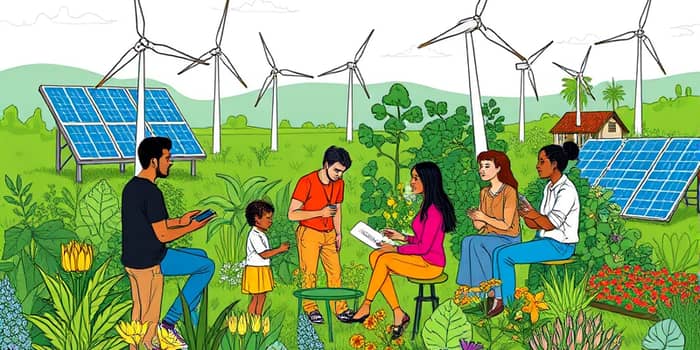The twenty-first century has brought unprecedented challenges—from climate change to resource depletion—but also remarkable opportunities for innovation. As consumers and investors demand greater accountability, entrepreneurs have a unique chance to shape the next wave of business success.
This article explores how visionary leaders can harness data, regulations, and emerging trends to launch ventures that are both profitable and planet-positive. By examining key statistics and practical models, we aim to guide you toward sustainable business ideas that will thrive in the years ahead.
Global Consumer Demand Fuels Sustainable Business Growth
Recent studies reveal that 72% of global consumers are willing to pay more for sustainable products. This trend reflects a profound shift in purchasing priorities, with buyers increasingly seeking brands that align with their values.
Moreover, 92% of buyers trust socially or environmentally responsible brands, and 55% are prepared to pay a premium for environmentally friendly options. These numbers underscore the importance of embedding sustainability into product design and marketing strategies.
As demand continues to rise, companies that fail to adapt risk losing market share. Entrepreneurs can seize this moment by developing offerings that meet both ethical standards and consumer expectations.
Regulatory Landscape and Reporting Requirements
Governments worldwide are tightening the rules for corporate sustainability. In the European Union, the Corporate Sustainability Reporting Directive (CSRD) will make detailed sustainability reporting mandatory for large firms by 2028, requiring rigorous third-party assurance.
Meanwhile, the International Sustainability Standards Board (ISSB) is rolling out global disclosure standards, setting a new benchmark for transparency. These regulations not only ensure accountability but also drive innovation in data management and performance tracking.
Entrepreneurs who proactively integrate these frameworks gain a competitive edge. Early adoption of robust reporting practices can streamline compliance, attract ESG-focused investors, and strengthen stakeholder trust.
Innovative Business Models for a Circular Economy
The era of take-make-waste is ending. A global shift to a circular economy by 2040 could save over $4.5 trillion, according to experts. In this model, products are designed for longevity, reuse, and regeneration.
Circular strategies include repair-and-resale services, upcycling waste materials into new goods, and implementing closed-loop manufacturing processes. By minimizing resource input and maximizing product lifecycles, businesses can reduce costs and environmental impact.
Transparency and traceability technologies—such as blockchain and AI-driven supply chain platforms—allow companies to demonstrate ethical sourcing and waste reduction, further enhancing consumer trust and brand value.
Top Industries and Practical Business Ideas
Certain sectors are ripe for sustainable disruption. Entrepreneurs can explore opportunities in:
- Energy auditing and green consulting to help clients cut emissions and energy use.
- Eco-friendly landscaping and urban garden planning, promoting local food security.
- Compost pickup and organic waste recycling services for households and businesses.
- Upcycling and recycling-based ventures that transform waste into high-value products.
- Electric vehicle charging infrastructure and maintenance for growing EV fleets.
Each idea addresses urgent environmental needs while tapping into evolving market demands. By offering specialized expertise, entrepreneurs can build loyal customer bases and secure recurring revenue streams.
Challenges and Strategic Considerations for Entrepreneurs
Despite the optimism, sustainable startups face hurdles. According to recent data, entrepreneurial activity in the U.S. is high, but many new ventures struggle to reach maturity due to funding gaps and profitability issues.
To overcome these challenges, founders must blend purpose with pragmatism. Conducting thorough market research, securing strategic partnerships, and adopting lean operational practices can help ensure long-term viability.
Key Statistics at a Glance
Technology as a Catalyst for Sustainability
Advancements in AI, IoT, and blockchain are enabling unprecedented levels of efficiency and transparency. Smart sensors can optimize energy use in real time, while AI-driven logistics reduce carbon footprints in transportation.
Blockchain enhances supply chain transparency, allowing consumers to verify product origins and companies to track materials throughout their lifecycle. These tools empower entrepreneurs to deliver measurable impact and tangible examples of sustainable business ideas.
Looking Forward: Opportunities and Impact
By 2026, ESG investments are projected to reach $33.9 trillion, representing over 20% of global assets under management. This influx of capital underscores a profound market shift toward sustainability-driven returns.
Entrepreneurs who embrace this shift can position themselves at the forefront of a movement that not only boosts profitability but also fosters environmental stewardship. The future belongs to those who see sustainability as both a moral imperative and a strategic advantage.
As you embark on your sustainable entrepreneurship journey, remember that every innovative idea, no matter how small, contributes to a ripple effect of positive change. Together, we can build businesses that honor the planet and empower communities for generations to come.
References
- https://www.arbor.eco/blog/sustainability-statistics
- https://www.keyesg.com/article/50-esg-statistics-you-need-to-know-in-2024
- https://www.travelperk.com/blog/business-sustainability-statistics/
- https://www.intuition.com/sustainability-in-2025-key-business-stats/
- https://quantive.com/resources/articles/2025-business-trends
- https://www.spglobal.com/esg/csa/yearbook/2025/ranking/index.aspx
- https://www.nerdwallet.com/article/small-business/sustainable-business-ideas
- https://entrepreneurship.babson.edu/gem-usa-2025/










